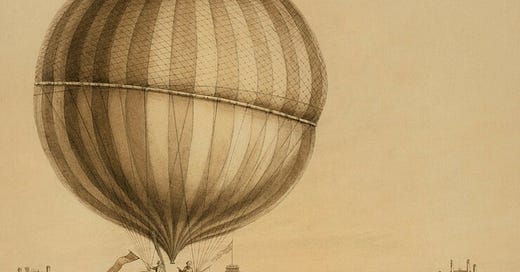Bubbles and Balloons
Anna Laetitia Barbauld, ‘Washing Day’
The hot-air balloon was invented in 1783 by the Montgolfier brothers, and it quickly stirred up a cultural craze. This poem makes an intriguing link between hot-air balloons and the soapy bubbles in a clothes-washing tub, highlighting the gap between men's and women's work.
I well remember, when a child, the awe
This day struck into me; for then the maids,
I scarce knew why, looked cross, and drove me from them;
Nor soft caress could I obtain, nor hope
Usual indulgencies; jelly or creams,
Relic of costly suppers, and set by
For me their petted one; or buttered toast,
When butter was forbid; or thrilling tale
Of ghost, or witch, or murder. So I went
And sheltered me beside the parlour fire;
There my dear grandmother, eldest of forms,
Tended the little ones, and watched from harm;
Anxiously fond, though oft her spectacles
With elfin cunning hid, and oft the pins
Drawn from her ravelled stocking, might have soured
One less indulgent.
At intervals my mother’s voice was heard,
Urging dispatch; briskly the work went on,
All hands employed to wash, to rinse, to wring,
Or fold, and starch, and clap, and iron, and plait.
Then would I sit me down, and ponder much
Why washings were; sometimes through hollow hole
Of pipe amused we blew, and sent aloft
The floating bubbles; little dreaming then
To see, Montgolfier, thy silken ball
Ride buoyant through the clouds, so near approach
The sports of children and the toils of men.
Earth, air, and sky, and ocean hath its bubbles,
And verse is one of them—this most of all.
About the author
Anna Laetitia Barbauld (1743-1825) was a poet, teacher, and author of children’s literature. Her poems cover many subjects, from the rights of women to the fate of living creatures to national politics, and had many admirers, William Wordsworth among them.
What We Love About This Passage...
Barbauld portrays women of different ages and roles on an ordinary washing day: the stalwart mothers and maids, the fond and indulgent grandmother, and the amused child poet, who runs around and exercises her imagination with equal freedom. We think this adds vibrancy to a scene of domestic realism.
The poem’s concluding image is as baffling as it is charming. What is Barbauld suggesting? Does the balloon and the buoyant flight of imagination it symbolises contrast with (and reject) the mundane reality of an exhausting washing day? Or does the image show that even a domestic scene can be transformed and elevated by the effervescence of verse?
To Read Alongside...
Barbauld is one of many women poets who versified scenes of domesticity and female labour. Mary Collier’s poem The Woman’s Labour, for instance, depicted the work 18th-century women had to do in the fields. Loads of plays also depict women at work: one example, Cicely Hamilton’s Diana of Dobson’s, features the harsh working conditions of shopgirls in the early 20th century.
Balloons, moreover, were a huge fascination for Romantic authors. In his sonnet ‘To a Balloon’, for instance, Percy Bysshe Shelley uses the balloon’s flight as a metaphor for his views of political hope and change. His wife Mary Shelley’s novel The Last Man even has an army of balloon aeronauts! The Victorians who came after were equally enraptured by hot air balloons: Richard Holmes writes all about it in his cultural history Falling Upwards: How We Took to the Air.
Enduring Love by Ian McEwan opens with an unforgettable scene of a hot-air balloon crash. The novel was made into a film (adapted by Joe Penhall) in 2004.
Shakespeare As You Like It gets the last word on balloons...they crop up in the famous 'All the World’s a Stage’ speech (Act 2, scene vii) about the seven ages of man, one of which is the soldier,
'Full of strange oaths, and bearded like the pard [leopard],
Jealous in honour, sudden, and quick in quarrel,
Seeking the bubble reputation
Even in the cannon's mouth.'
Today's curator
Jacky, Ho Lung Chan curated today's newsletter. Jacky is a final-year undergraduate in English at the University of Oxford.
Suggest a LitHit!
Tell us your own favourites from literature you've read, and we can feature you as a Guest Curator. Just email us with the following information:
Your full name
The title of the book you're suggesting
The location of the excerpt within the book (e.g., "in the middle of chapter 5"), or the excerpt itself copied into the email or attached to it (in Word)
Why you love it, in just a few sentences
About LitHits
You might also enjoy...
“Five Tips to Get Reading Again if You’ve Struggled During the Pandemic,” The Conversation (8 January 2021): https://theconversation.com/five-tips-to-get-reading-again-if-youve-struggled-during-the-pandemic-152904
Writers Make Worlds: https://writersmakeworlds.com/
The Ten Minute Book Club: https://www.english.ox.ac.uk/ten-minute-book-club
Project Gutenberg: https://www.gutenberg.org/
Standard Ebooks: https://standardebooks.org/
Feedback
We'd love to hear your thoughts on our newsletter:
kirsten@lit-hits.co.uk
Graphic design by Sara Azmy
All curation content © 2022 LitHits. All rights reserved.




